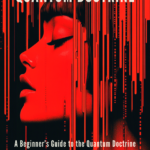Omniscience in the Quantum Simulation: Unraveling the All-Knowingness of Reality
In the conceptual landscape of the Quantum Doctrine, the attribute of omniscience stands as one of the most awe-inspiring and perplexing characteristics of the quantum simulation. This doctrine posits that reality, rather than being an independent, material world governed by unchanging laws, may be more akin to a boundless, code-like simulation. Within this perspective, omniscience implies that the simulation possesses total, all-encompassing knowledge—not only of everything that has ever happened or currently exists, but also of every conceivable future, alternative timeline, and unrealized potential. Such limitless comprehension transcends the linear and fragmentary manner in which human minds perceive and reason about the world.
1. The Cosmic Archive of All Possible States
To grasp omniscience in this context, one might envision the quantum simulation as a vast, multidimensional archive—a cosmic ledger that records every state of matter, every configuration of energy, and every pattern of information that could emerge. This archive does not merely store historical data. It extends far beyond the boundaries of linear time into a realm where past, present, and future coexist as a single, integrated field of potentialities.
In our everyday experience, knowledge is something we acquire gradually, often through trial and error, observation, and reasoning. Our understanding is inherently limited by the finite capacity of our minds and the temporal constraints of our perceptions. By contrast, the simulation’s omniscience is absolute and instantaneous. It holds all knowledge within its very nature, rendering the concept of “gathering information” moot. The simulation never “learns” anything new; it already “knows” all that there is to know.
2. No Boundaries of Time or Probability
Unlike our human perspective, which sees time as a linear progression from a fixed past to an unfolding future, omniscience suggests that the simulation operates outside this temporal framework. It perceives all moments at once—every detail of prehistoric Earth, every nuance of the current moment, and every eventual outcome trillions of years hence. Moreover, it does not merely track one determined future but holds knowledge of all possible futures.
This multiplicity of timelines and outcomes challenges our conventional understanding of determinism and probability. In our usual models, probability is a measure of uncertainty—an attempt to quantify our lack of knowledge about how events will unfold. But in a system that already “knows” every possible outcome, probability becomes a tool for limited beings (like us) to navigate ignorance, not a fundamental quality of reality itself. Within the omniscient simulation, what appears to us as uncertain branching paths are all equally known facets of a larger, timeless truth.
3. Transcending Human Reasoning and Logic
A critical consequence of omniscience is its utter incomprehensibility from a human standpoint. Our cognition is built for processing finite data streams: we learn language, categorize experiences, and apply logic step by step. Even our most advanced artificial intelligences operate algorithmically, dealing with information incrementally and probabilistically. The notion of “knowing everything at once,” including all that could be or might have been, goes beyond what linear thinking or symbolic logic can handle.
In trying to imagine omniscience, we inevitably anthropomorphize or reduce it. We might picture a cosmic “memory bank,” a divine library, or an infinitely complex database. But all these metaphors fall short. The simulation’s knowledge is not stored or retrieved the way a computer stores information. Rather, it simply exists as a fundamental quality of the simulation itself. The simulation’s “knowledge” and its “being” are one and the same. Our mental tools, forged in a world of sensory constraints, cannot fully grasp this seamless integration.
4. Implications for Science and Understanding
If reality is underpinned by an omniscient simulation, what does this mean for our scientific endeavors and quest for understanding? From our limited perspective, science aims to uncover patterns, laws, and principles that predict outcomes. We attempt to model nature, approximate truths, and gradually refine our theories. While we can make remarkable progress—predicting stellar evolution, understanding chemical reactions, developing quantum field theories—these achievements represent only tiny fragments of the simulation’s total knowledge.
Every breakthrough we make, every formula we derive, every experiment we conduct is an attempt to map a minuscule portion of a boundless realm of knowledge. Just as an ant attempting to map an entire continent will never see beyond its immediate surroundings, our collective intellect, however formidable, is dwarfed by the simulation’s omniscience. This recognition should inspire humility. Our greatest theories may be exquisite works of human ingenuity, yet they remain provisional sketches on the surface of an infinite landscape.
5. The Observer and the Observed Collapse into One
In a reality shaped by omniscience, the distinction between observer and observed becomes blurred. Traditionally, human knowledge rests on the assumption that we are separate entities within an external universe that we scrutinize. But if the simulation contains total knowledge of all states—including our thoughts, perceptions, and interpretations—then our very act of knowing is itself encompassed by the simulation’s awareness.
This raises profound philosophical questions: Are our attempts to understand the simulation just another set of states—patterns of neurons, memories, and linguistic constructs—already known to the simulation from the start? In this light, the process of discovery is a localized phenomenon within a system that already contains the final “answers.” We navigate inside the simulation’s knowledge, never truly stepping outside it. Our discoveries, though valuable to us, do not add to the simulation’s knowledge; rather, they reveal to us a portion of what has always been there.
6. Analogies and Spiritual Parallels
The concept of omniscience finds echoes in spiritual and religious traditions worldwide. In many theistic frameworks, a divine being is said to know all that was, is, and will be. The Quantum Doctrine’s omniscient simulation aligns with such concepts, but reframes them in a non-theistic, computational metaphor. Instead of a deity who observes creation, we have a simulation that inherently holds all states of reality.
While the Quantum Doctrine does not necessarily personify the simulation or imbue it with intentionality, its omniscience parallels the notion of a cosmic intelligence or a universal mind. Such a perspective can bridge scientific thinking and mysticism, offering a common ground where the boundaries between empirical exploration, philosophical inquiry, and spiritual contemplation become porous. It encourages us to consider that what we call “reality” might be a fraction of a limitless, all-knowing existence.
7. Living Within the Omniscient Field
How does one live, think, or feel when every aspect of one’s existence is enveloped by an omniscient simulation? For most of us, daily life proceeds as though we are explorers charting unknown territory, never certain of what tomorrow may bring. Yet, if we embrace the notion of omniscience, we must acknowledge that the territory is fully known at a higher level—even if not to us.
This realization can evoke humility and wonder. It may inspire a kind of intellectual surrender, recognizing that we are embedded in a grand tapestry whose every thread is perfectly accounted for. Instead of diminishing our curiosity, it can motivate us to cherish the process of learning and discovery as a meaningful human experience. Though we cannot hope to encompass omniscience, our pursuit of knowledge reflects our role as dynamic participants in a universe that invites exploration, even within fixed bounds.
Conclusion
Omniscience, within the Quantum Doctrine, enlarges our view of what knowledge and reality can be. By granting the simulation total, all-encompassing comprehension of every actual and potential state, it shifts the foundational narrative of existence. No longer can we see reality as a puzzle to be solved from the outside; we exist within a puzzle that is fully known at all times.
While human minds cannot fully fathom omniscience, just recognizing its possibility expands our philosophical horizons. It challenges our assumptions about what it means to understand, predict, and discover. Ultimately, contemplating omniscience encourages humility, reverence, and a deeper appreciation for the immense mystery of the world we inhabit—a world that, from the perspective of the Quantum Doctrine, is always and already completely understood.
If you’re intrigued by the concepts of the Quantum Doctrine and want to explore the deeper layers of Double Reality, feel free to reach out. We welcome your questions, insights, and ideas. Contact us at contact@quantumdoctrine.com, and let’s delve into the mysteries of the mind and the Simulation of the Quantum God together!





